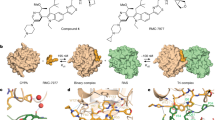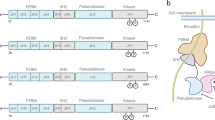Abstract
Activation of androgen receptor (AR) may have a role in the development of castration-resistant prostate cancer. Two intracellular tyrosine kinases, Ack1 (activated cdc42-associated kinase) and Src, phosphorylate and enhance AR activity and promote prostate xenograft tumor growth in castrated animals. However, the upstream signals that activate these kinases and lead to AR activation are incompletely characterized. In this study, we investigated AR phosphorylation in response to non-androgen ligand stimulation using phospho-specific antibodies. Treatment of LNCaP and LAPC-4 cells with epidermal growth factor (EGF), heregulin, Gas6 (ligand binding to the Mer receptor tyrosine kinase and activating Ack1 downstream), interleukin (IL)-6 or bombesin stimulated cell proliferation in the absence of androgen. Treatment of LNCaP and LAPC-4 cells with EGF, heregulin or Gas6 induced AR phosphorylation at Tyr-267, whereas IL-6 or bombesin treatment did not. AR phosphorylation at Tyr-534 was induced by treatment with EGF, IL-6 or bombesin, but not by heregulin or Gas6. Small interfering RNA-mediated knockdown of Ack1 or Src showed that Ack1 mediates heregulin- and Gas6-induced AR Tyr-267 phosphorylation, whereas Src mediates Tyr-534 phosphorylation induced by EGF, IL-6 and bombesin. Dasatinib, a Src inhibitor, blocked EGF-induced Tyr-534 phosphorylation. In addition, we showed that dasatinib also inhibited Ack1 kinase. Dasatinib inhibited heregulin-induced Ack1 kinase activity and AR Tyr-267 phosphorylation. In addition, dasatinib inhibited heregulin-induced AR-dependent reporter activity. Dasatinib also inhibited heregulin-induced expression of endogenous AR target genes. Dasatinib inhibited Ack1-dependent colony formation and prostate xenograft tumor growth in castrated mice. Interestingly, Ack1 or Src knockdown or dasatinib did not inhibit EGF-induced AR Tyr-267 phosphorylation or EGF-stimulated AR activity, suggesting the existence of an additional tyrosine kinase that phosphorylates AR at Tyr-267. These data suggest that specific tyrosine kinases phosphorylate AR at distinct sites and that dasatinib may exert antitumor activity in prostate cancer through inhibition of Ack1.
This is a preview of subscription content, access via your institution
Access options
Subscribe to this journal
Receive 50 print issues and online access
$259.00 per year
only $5.18 per issue
Buy this article
- Purchase on Springer Link
- Instant access to full article PDF
Prices may be subject to local taxes which are calculated during checkout








Similar content being viewed by others
References
Araujo J, Armstrong AJ, Braud EL, Posadas E, Lonberg M, Gallick GE et al. (2009). Dasatinib and docetaxel combination treatment for patients with castration-resistant progressive prostate cancer: a phase I/II study (CA180086). J Clin Oncol 27 (suppl): abstract 5061.
Araujo J, Logothetis C . (2009). Targeting Src signaling in metastatic bone disease. Int J Cancer 124: 1–6.
Brave M, Goodman V, Kaminskas E, Farrell A, Timmer W, Pope S et al. (2008). Sprycel for chronic myeloid leukemia and Philadelphia chromosome-positive acute lymphoblastic leukemia resistant to or intolerant of imatinib mesylate. Clin Cancer Res 14: 352–359.
Carter TA, Wodicka LM, Shah NP, Velasco AM, Fabian MA, Treiber DK et al. (2005). Inhibition of drug-resistant mutants of ABL, KIT, and EGF receptor kinases. Proc Natl Acad Sci USA 102: 11011–11016.
Chen CD, Welsbie DS, Tran C, Baek SH, Chen R, Vessella R et al. (2004). Molecular determinants of resistance to antiandrogen therapy. Nat Med 10: 33–39.
DaSilva J, Gioeli D, Weber MJ, Parsons SJ . (2009). The neuroendocrine-derived peptide parathyroid hormone-related protein promotes prostate cancer cell growth by stabilizing the androgen receptor. Cancer Res 69: 7402–7411.
Desai SJ, Ma AH, Tepper CG, Chen HW, Kung HJ . (2006). Inappropriate activation of the androgen receptor by nonsteroids: involvement of the Src kinase pathway and its therapeutic implications. Cancer Res 66: 10449–10459.
Forbes S, Clements J, Dawson E, Bamford S, Webb T, Dogan A et al. (2006). Cosmic 2005. Br J Cancer 94: 318–322.
Galisteo ML, Yang Y, Urena J, Schlessinger J . (2006). Activation of the nonreceptor protein tyrosine kinase Ack by multiple extracellular stimuli. Proc Natl Acad Sci USA 103: 9796–9801.
Gioeli D, Ficarro SB, Kwiek JJ, Aaronson D, Hancock M, Catling AD et al. (2002). Androgen receptor phosphorylation. Regulation and identification of the phosphorylation sites. J Biol Chem 277: 29304–29314.
Gioeli D, Black BE, Gordon V, Spencer A, Kesler CT, Eblen ST et al. (2006). Stress kinase signaling regulates androgen receptor phosphorylation, transcription, and localization. Mol Endocrinol 20: 503–515.
Gong J, Zhu J, Goodman Jr OB, Pestell RG, Schlegel PN, Nanus DM et al. (2006). Activation of p300 histone acetyltransferase activity and acetylation of the androgen receptor by bombesin in prostate cancer cells. Oncogene 25: 2011–2021.
Gregory CW, Hamil KG, Kim D, Hall SH, Pretlow TG, Mohler JL et al. (1998). Androgen receptor expression in androgen-independent prostate cancer is associated with increased expression of androgen-regulated genes. Cancer Res 58: 5718–5724.
Gregory CW, Johnson Jr RT, Mohler JL, French FS, Wilson EM . (2001). Androgen receptor stabilization in recurrent prostate cancer is associated with hypersensitivity to low androgen. Cancer Res 61: 2892–2898.
Gregory CW, Fei X, Ponguta LA, He B, Bill HM, French FS et al. (2004). Epidermal growth factor increases coactivation of the androgen receptor in recurrent prostate cancer. J Biol Chem 279: 7119–7130.
Gregory CW, Whang YE, McCall W, Fei X, Liu Y, Ponguta LA et al. (2005). Heregulin-induced activation of HER2 and HER3 increases androgen receptor transactivation and CWR-R1 human recurrent prostate cancer cell growth. Clin Cancer Res 11: 1704–1712.
Guo Z, Dai B, Jiang T, Xu K, Xie Y, Kim O et al. (2006). Regulation of androgen receptor activity by tyrosine phosphorylation. Cancer Cell 10: 309–319.
Klein KA, Reiter RE, Redula J, Moradi H, Zhu XL, Brothman AR et al. (1997). Progression of metastatic human prostate cancer to androgen independence in immunodeficient SCID mice. Nat Med 3: 402–408.
Kraus S, Gioeli D, Vomastek T, Gordon V, Weber MJ . (2006). Receptor for activated C kinase 1 (RACK1) and Src regulate the tyrosine phosphorylation and function of the androgen receptor. Cancer Res 66: 11047–11054.
Lee LF, Guan J, Qiu Y, Kung HJ . (2001). Neuropeptide-induced androgen independence in prostate cancer cells: roles of nonreceptor tyrosine kinases Etk/Bmx, Src, and focal adhesion kinase. Mol Cell Biol 21: 8385–8397.
Liu Y, Majumder S, McCall W, Sartor CI, Mohler JL, Gregory CW et al. (2005). Inhibition of HER-2/neu kinase impairs androgen receptor recruitment to the androgen responsive enhancer. Cancer Res 65: 3404–3409.
Mahajan NP, Whang YE, Mohler JL, Earp HS . (2005). Activated tyrosine kinase Ack1 promotes prostate tumorigenesis: role of Ack1 in polyubiquitination of tumor suppressor Wwox. Cancer Res 65: 10514–10523.
Mahajan NP, Liu Y, Majumder S, Warren MR, Parker CE, Mohler JL et al. (2007). Activated Cdc42-associated kinase Ack1 promotes prostate cancer progression via androgen receptor tyrosine phosphorylation. Proc Natl Acad Sci USA 104: 8438–8443.
Mellinghoff IK, Vivanco I, Kwon A, Tran C, Wongvipat J, Sawyers CL . (2004). HER2/neu kinase-dependent modulation of androgen receptor function through effects on DNA binding and stability. Cancer Cell 6: 517–527.
Pao-Chun L, Chan PM, Chan W, Manser E . (2009). Cytoplasmic ACK1 interaction with multiple receptor tyrosine kinases is mediated by Grb2: an analysis of ACK1 effects on Axl signaling. J Biol Chem 284: 34954–34963.
Park SI, Zhang J, Phillips KA, Araujo JC, Najjar AM, Volgin AY et al. (2008). Targeting SRC family kinases inhibits growth and lymph node metastases of prostate cancer in an orthotopic nude mouse model. Cancer Res 68: 3323–3333.
Ponguta LA, Gregory CW, French FS, Wilson EM . (2008). Site-specific androgen receptor serine phosphorylation linked to epidermal growth factor-dependent growth of castration-recurrent prostate cancer. J Biol Chem 283: 20989–21001.
Scher HI, Sawyers CL . (2005). Biology of progressive, castration-resistant prostate cancer: directed therapies targeting the androgen-receptor signaling axis. J Clin Oncol 23: 8253–8261.
Ueda T, Bruchovsky N, Sadar MD . (2002a). Activation of the androgen receptor N-terminal domain by interleukin-6 via MAPK and STAT3 signal transduction pathways. J Biol Chem 277: 7076–7085.
Ueda T, Mawji NR, Bruchovsky N, Sadar MD . (2002b). Ligand-independent activation of the androgen receptor by interleukin-6 and the role of steroid receptor coactivator-1 in prostate cancer cells. J Biol Chem 277: 38087–38094.
van der Horst EH, Degenhardt YY, Strelow A, Slavin A, Chinn L, Orf J et al. (2005). Metastatic properties and genomic amplification of the tyrosine kinase gene ACK1. Proc Natl Acad Sci USA 102: 15901–15906.
Wang Y, Kreisberg JI, Ghosh PM . (2007). Cross-talk between the androgen receptor and the phosphatidylinositol 3-kinase/Akt pathway in prostate cancer. Curr Cancer Drug Targets 7: 591–604.
Yang JC, Ok JH, Busby JE, Borowsky AD, Kung HJ, Evans CP . (2009). Aberrant activation of androgen receptor in a new neuropeptide-autocrine model of androgen-insensitive prostate cancer. Cancer Res 69: 151–160.
Yu EY, Wilding G, Posadas E, Gross M, Culine S, Massard C et al. (2009). Phase II study of dasatinib in patients with metastatic castration-resistant prostate cancer. Clin Cancer Res 15: 7421–7428.
Zhang J, Thomas TZ, Kasper S, Matusik RJ . (2000). A small composite probasin promoter confers high levels of prostate-specific gene expression through regulation by androgens and glucocorticoids in vitro and in vivo. Endocrinology 141: 4698–4710.
Acknowledgements
We thank Francis Lee of Bristol-Myers-Squibb for providing dasatinib, Charlene Ross and staff of the UNC Lineberger Animal Studies Facility for assistance in xenograft tumor experiments, Dominic Moore for statistical analysis and Nupam Mahajan for discussions and sharing unpublished papers. This study was supported by grants from NIH R01CA120921 (YEW), NIH R01CA120304 (HSE) and NIH T32ES007017 (MK).
Author information
Authors and Affiliations
Corresponding author
Ethics declarations
Competing interests
The authors declare no conflict of interest.
Additional information
Supplementary Information accompanies the paper on the Oncogene website
Supplementary information
Rights and permissions
About this article
Cite this article
Liu, Y., Karaca, M., Zhang, Z. et al. Dasatinib inhibits site-specific tyrosine phosphorylation of androgen receptor by Ack1 and Src kinases. Oncogene 29, 3208–3216 (2010). https://doi.org/10.1038/onc.2010.103
Received:
Revised:
Accepted:
Published:
Issue Date:
DOI: https://doi.org/10.1038/onc.2010.103
Keywords
This article is cited by
-
The testosterone paradox of advanced prostate cancer: mechanistic insights and clinical implications
Nature Reviews Urology (2023)
-
Phytochemistry of Prunus africana and its therapeutic effect against prostate cancer
Comparative Clinical Pathology (2022)
-
Src family kinases, adaptor proteins and the actin cytoskeleton in epithelial-to-mesenchymal transition
Cell Communication and Signaling (2021)
-
Interaction between androgen receptor and coregulator SLIRP is regulated by Ack1 tyrosine kinase and androgen
Scientific Reports (2019)
-
Blockade of ACK1/TNK2 To Squelch the Survival of Prostate Cancer Stem-like Cells
Scientific Reports (2018)



